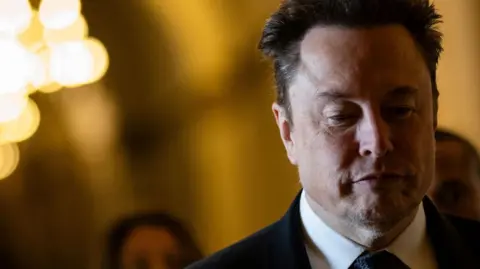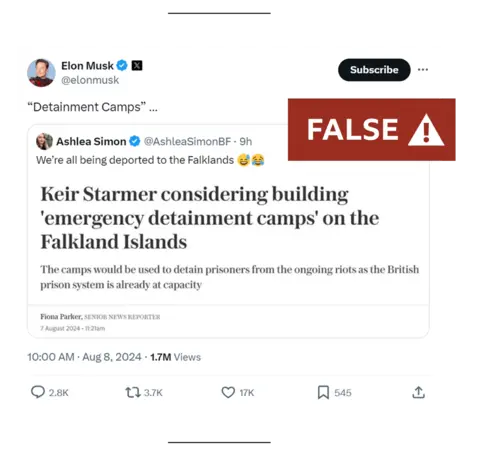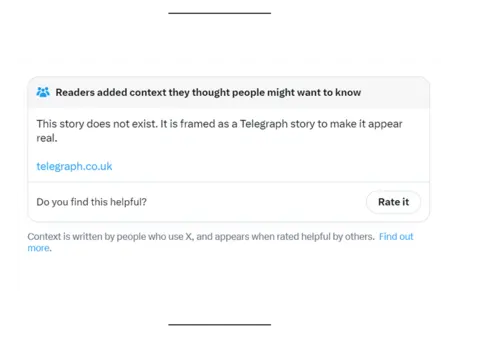
 Getty Images
Getty ImagesElon Musk has deleted an image he shared on X, formerly Twitter, which promoted a conspiracy theory about the UK building “detainment camps” on the Falkland Islands for rioters.
The image – which was faked to look like it had come from the Daily Telegraph website – had been posted by the co-leader of the far-right Britain First party, Ashlea Simon, though it had appeared elsewhere before she shared it.
Mr Musk’s post was viewed more than 1.7 million times before it was removed – with Ms Simon’s post briefly tagged with a note reading “this story does not exist” before it too was removed.
It is the latest in a series of controversial interventions from the tech billionaire since the unrest began, some of which have been directly condemned by the prime minister.
The role of social media platforms, including X, in the disorder is also the subject of intense scrutiny, with the government and media regulator urging greater action from them.
Mr Musk has not acknowledged he published then deleted the post. The BBC has approached X for comment.
The Telegraph has stressed it did not publish any such article.
“This is a fabricated headline for an article that does not exist,” said a Telegraph Media Group spokesperson.
“We notified relevant platforms and requested that the post be taken down.”
 X
XBefore it was removed, comments under Mr Musk’s post compared the UK to a fascist state.
It comes as the UK government is grappling with how to deal with misinformation online in the face of unrest across England and in Northern Ireland.
The government and Ofcom both say social media companies should act over their role in the crisis, and the media regulator will get enhanced powers under the Online Safety Act by 2025 to take firmer action against such posts.
Mr Musk has previously replied to a post on X from the prime minister – in which Sir Keir said he would not tolerate attacks on mosques or Muslim communities – asking: “Shouldn’t you be concerned about attacks on *all* communities?”
When asked about comments from Mr Musk, Sir Keir previously said “my focus is on ensuring our communities are safe. That is my sole focus. I think it’s very important for us all to support the police in what they’re doing”.
 X
XCommunity notes
Before Mr Musk bought Twitter in 2022, Britain First had been banned from the social media site under its hate speech rules.
But he lifted the ban after he took over, saying at the time that he was “against censorship that goes far beyond the law“, and labelled himself a “free speech absolutist”.
For that reason, Britain First – and other far-right figures including its then-leaders – were able to return to the platform.
Mr Musk has used his platform in the past to praise its “community notes” feature, which allows X’s own users to partially verify whether posts are real or not.
But it has been accused of taking too long – and in this case, no such notes appeared under Mr Musk’s post by the time it was deleted.
It took just under 10 hours for a community note to appear underneath the original post shared by Ms Simon.



Be the first to comment